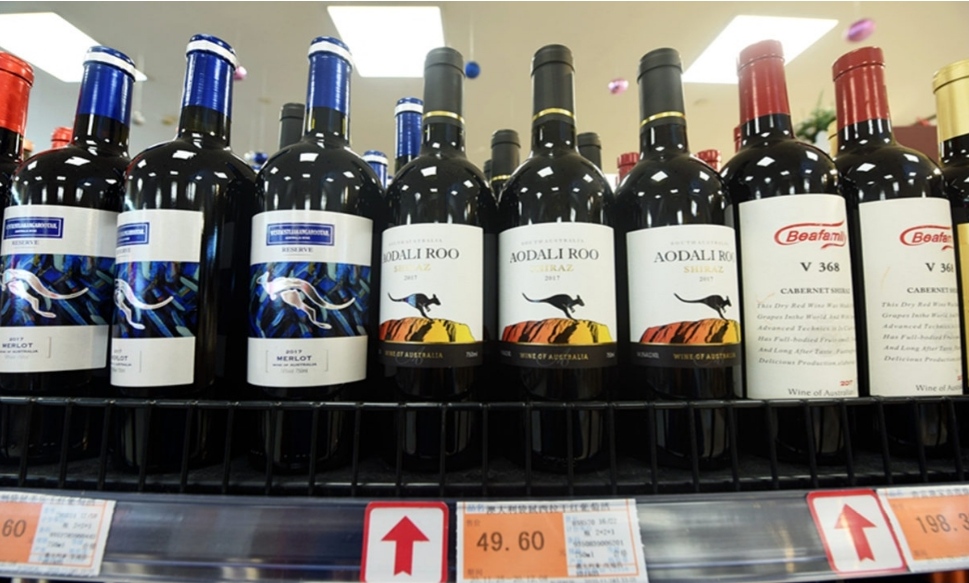China, Australia make steady progress in addressing wine trade dispute
By Chu Daye
Cancellation, reduction of tariffs could be possible outcome: analysts

Bottles of Australian wine on the shelf of a supermarket in Hangzhou, East China’s Zhejiang Province on November 27, 2020
Frequent diplomatic and trade exchanges between China and Australia are conducive to resolving lingering bilateral trade disputes, Chinese experts said on Monday, commenting on a steady pattern of recent dialogues.
A pragmatic, non-political way of approaching trade disputes will lead to the earlier settlement of these issues, such as the dispute over wine, Chinese analysts said, while noting that lifting wine tariffs requires the completion of due procedures to ensure fairness and openness.
If the Australian side chooses to use overly aggressive, pushy rhetoric, it won’t be helpful to the current state of affairs, they said.
Australian Trade Minister Don Farrell said on Sky News on Sunday that he was hopeful China would lift tariffs on Australian wine once a review finished by the end of March, and that good progress was also being made in relation to lobster imports, Reuters reported.
However, Farrell said that Australia would not hesitate to resume a WTO suit against the tariffs if China did not remove them after the review.
In a response to Farrell’s statement, Chinese Ambassador Xiao Qian said at an event on Monday that China’s review of tariffs on Australian wine is progressing well, although Xiao did not confirm an Australian government claim the dispute would be resolved this month, according to Reuters.
The attention to wine came amid more diplomatic exchanges between the two countries lately.
On Friday, Chinese Vice Foreign Minister Ma Zhaoxu met with Ambassador of Australia to China Scott Dewar, and the two had an exchange of views on China-Australia relations and issues of mutual interest and concern, according to a statement of the Chinese Foreign Ministry.
Chinese experts said that with the enhanced level of exchanges at the diplomatic, business and other working levels, some controversial issues such as the wine dispute are expected to be resolved in the near future.
Chen Hong, director of the Australian Studies Center of East China Normal University, told the Global Times on Monday that if the two sides focus on the issue from a pure business and technical approach, and don’t politicize the issue, there is a fair chance that the issue will be resolved.
“Barley has set a good example in how the two sides can respond to and address economic issues of mutual concern,” Chen said, predicting that a cancellation or a reduction of wine tariffs could be the outcome.
However, Chen noted that pushy rhetoric will not accelerate the settlement of the dispute.
China imposed anti-dumping and countervailing tariffs on Australian wines on March 28, 2021.
In November last year, the Chinese Ministry of Commerce (MOFCOM) began to review the anti-dumping and countervailing duties on Australian wine.
Sensing a change in the wind, some traders have been developing commercial strategies in advance with some choosing to increase their imports from Australia and store the wine in Hong Kong for the time being.
Chen Wei, an Australian wine importer, told the Global Times on Monday that there is “a high chance” that the two sides will resolve the wine dispute by the end of March.
However, he admitted that the domestic wine market underperformed in 2023. “Our company still has loads of French and Chilean wines in inventory, the result of diversification efforts in recent years. Even if the tariffs on Australian wine are lifted, we will not be importing right away.”
Chinese Commerce Minister Wang Wentao met with Farrell on February 26 in Abu Dhabi. They exchanged views on bilateral economic and trade relations and issues of mutual concern, with a focus on creating a favorable environment for business collaboration.
“The Albanese administration aims to repair Australia’s China trade ties, damaged by the previous Morrison administration,” Liu Qing, vice president at the China Institute of International Studies, told the Global Times on Monday. “The Chinese side is taking these issues with a sincere attitude.”
With China and Australia making significant efforts to repair their relations, the warming-up of bilateral economic and trade ties has a good foundation. It will just take time for the relevant authorities to complete the due procedure of the review, which is an administrative procedure, Liu said.
“As bilateral relations pick up, the Chinese people’s favorable impression of Australia has gradually increased, and their confidence in Australian products has also increased,” Liu noted. “This is also good news for wine, lobsters and other Australian products and services.”
“This dispute is undoubtedly an important move by China to bring the trade dispute … back to the economic sphere,” Yu Lei, chief research fellow at the Research Center for Pacific Island Countries of Liaocheng University, told the Global Times on Monday. “It is hoped that Australia can also lift various restrictions and obstructions on Chinese goods and investment activities.”
“China’s imposing of tariffs on Australian wine was an economic act, based on complaints from peers, and was not politicized. On the contrary, Australia has yet to lift its discriminatory review of Chinese investments – for example, its ban on Chinese companies such as Huawei,” Yu said.
Analysts noted that Chinese consumers now have a wide array of countries to choose among for wines and lobsters, and in the future, quality will be the determining factor in gaining market share in China.



